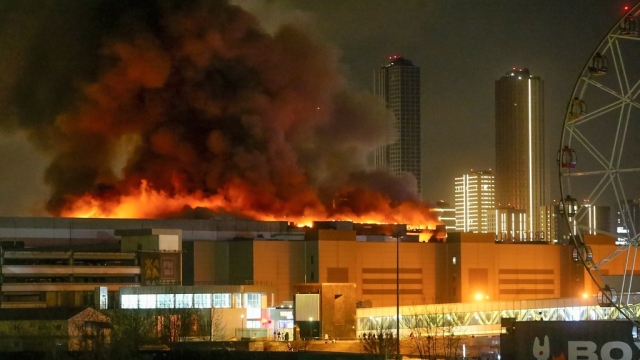Russian authorities detained 11 people, state media reported Saturday, after gunmen stormed a concert hall in Moscow in a grisly attack that left at least 115 people dead.
Russia's Investigative Committee said four of those detained were directly involved in the attack that left the sprawling shopping mall and music venue smoldering with a collapsed roof.
Russian agencies appeared to suggest the attack was linked to Ukraine even though the Islamic State group claimed responsibility in a statement. A U.S. intelligence official told The Associated Press that U.S. agencies had confirmed that that group was responsible for the attack.
The White House said, "The United States strongly condemns the heinous terrorist attack in Moscow. We extend our deepest condolences to those who lost loved ones and to those who were injured or affected by these unconscionable attacks against innocent civilians. ISIS is a common terrorist enemy that must be defeated everywhere."
The four suspects were stopped in the Bryansk region of western Russia, "not far from the border with Ukraine," Russia's Investigative Committee said. They planned to cross the border into Ukraine and "had contacts" there, state news agency Tass said, citing Russia's FSB. The head of the FSB briefed President Vladimir Putin on the arrests on Saturday, according to Tass.
The attack came just days after Putin cemented his grip on power in a highly orchestrated electoral landslide. The attack was the deadliest in Russia in years and came as the country's fight in Ukraine dragged into a third year.
Shortly after the attack, some Russian lawmakers pointed the finger at Ukraine. Mykhailo Podolyak, an adviser to Ukrainian President Volodymyr Zelenskyy, denied any involvement.
"Ukraine has never resorted to the use of terrorist methods," he posted on X, formerly Twitter. "Everything in this war will be decided only on the battlefield."
Images shared by Russian state media Saturday showed a fleet of emergency vehicles still gathered outside the ruins of Crocus City Hall, which had a capacity of more than 6,000 people in Krasnogorsk, on Moscow's western edge.
Videos posted online showed gunmen in the venue shooting civilians at point-blank range. The roof of the theater, where crowds had gathered Friday for a performance by the Russian rock band Picnic, collapsed in the early hours of Saturday morning as firefighters spent hours fighting a fire that erupted during the attack.
In a statement posted by its Aamaq news agency, the Islamic State's affiliate in Afghanistan said it had attacked a large gathering of "Christians" in Krasnogorsk. It was not immediately possible to verify the authenticity of the claim.
SEE MORE: Islamic State claims responsibility for deadly Moscow terror attack
A U.S. intelligence official told the AP that U.S. intelligence agencies had gathered information in recent weeks that the IS branch was planning an attack in Moscow, and that U.S. officials had privately shared the intelligence earlier this month with Russian officials.
The official was briefed on the matter but was not authorized to publicly discuss the intelligence information and spoke to the AP on condition of anonymity.
Messages of outrage, shock and support for those affected have since streamed in from around the world.
On Friday, the U.N. Security Council condemned "the heinous and cowardly terrorist attack" and underlined the need for the perpetrators to be held accountable. U.N. Secretary-General Antonio Guterres also condemned the terrorist attack "in the strongest possible terms," his spokesman said.
Meanwhile, in Moscow itself, hundreds of people stood in line Saturday morning to donate blood and plasma, Russia's health ministry said.
Putin, who extended his grip on Russia for another six years in this week's presidential vote after a sweeping crackdown on dissent, had publicly denounced the Western warnings of a potential terrorist attack as an attempt to intimidate Russians. "All that resembles open blackmail and an attempt to frighten and destabilize our society," he said earlier this week.
In October 2015, a bomb planted by the Islamic State downed a Russian passenger plane over Sinai, killing all 224 people on board, most of them Russian vacation-goers returning from Egypt. The group, which operates mainly in Syria and Iraq but also in Afghanistan and Africa, has claimed several attacks in Russia's volatile Caucasus and other regions in the past years.
Trending stories at Scrippsnews.com



